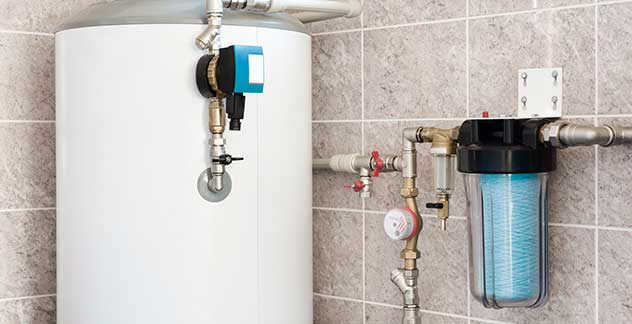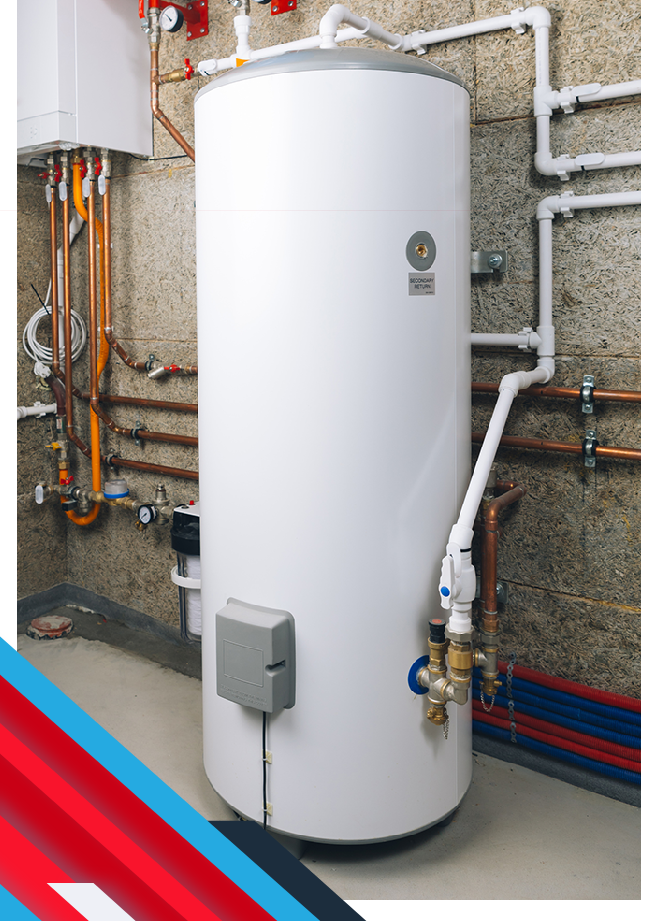Hot Water Heater Sales & Service in Mt. Vernon, OH
After heating and cooling, water heating is typically the largest energy user in the home because it is necessary for so many domestic activities.
The capacity of a water heater is essential because your water heater should provide enough hot water at the busiest time of the day. We offer various electric, gas, and tankless water heaters.

Contact Us
Features | Energy Saver Direct Vent | Energy Saver | High Efficiency Electric | Everhot Tankless |
| Type | Gas | Gas | Electric | Gas |
| Energy Efficiency | High efficiency | Standard Efficiency | High Efficiency | Ultra High Efficiency |
| Tank Capacity | 40-50 gal. | 30-100 gal. | 40-80- gal. | 2.5 gal. per minute |
| Vent - Type | Direct Vent | Standard Vent | None | Direct Vent |
| Factory Warranty Tank | 6 or 10 years | 6 or 10 years | 6 or 10 years | 10 years on heat exchanger |
| Factory Warranty Parts | 6 years | 6 years | 6 years | 5 years |
Water Heating FAQs
What does the energy factor (EF) on my water heater mean?
The water heater Energy Factor (EF) measures the water heater’s overall efficiency. This is determined by comparing the energy in the heated water used daily to the total daily energy consumption of the water heater.
The EF can be used to compare the energy efficiency of water heaters. Water heaters with higher EFs will have lower annual operating costs than comparable models with lower EFs. A higher EF signifies a more efficient model.
Water heaters with high EF ratings may cost more initially but save energy and money in the long run. Eventually, they will pay for themselves through a lifetime of energy savings.
Where is the 'anode rod' and what does it do?
The anode rod is often referred to as a “sacrificial rod.” For most water heaters, the anode rod is attached to the hot water outlet of the water heater. If you are facing the front of the water heater (where the labels are), the hot water outlet is on the left-hand side.
Most water is rarely “pure.” It can contain oxygen, magnesium, fluoride, chlorine, and suspended particles. These components, in the concentrations in your water, are usually not bad for you. However, they do contribute to the taste and smell of the water.
They also impart a slight conductivity to the water. Through an electrical process called electrolysis, this conductivity will eventually (over a long period of time) cause most metals to rust or corrode. When the water is heated, this electrical process can be accelerated.
Most water heaters are made of a steel tank with a porcelain enamel (glass) lining. However, due to production and assembly methods, it is not always possible to completely cover the inside of the tank. This is where the sacrificial anode rod comes in.
The anode rod draws the harmful electrolytic process away from the water heater tank by acting as a lightning rod for the corrosion process. It focuses the corrosion on the anode rod instead. Water heaters need this sacrificial anode rod to ensure that the electrolysis does not affect the tanks.
Why doesn't my old water heater make as much hot water as it used to?
The answer may be that you have sediment buildup in your tank. As water heaters age, they tend to accumulate sediment and lime deposits. If the heaters are not cleaned periodically, the sediment may rise to a level that will act as a barrier between the burner and the water, making it harder to heat.
An article published in a national ASPE plumbing journal states that every half inch of sediment on the bottom of a gas-fired water heater requires up to 70% more fuel to heat the water.
If my water heater was in a flood, do I need to replace it?
Yes. The Air-Conditioning, Heating and Refrigeration Institute (AHRI) recommends that any flood-damaged heating and cooling equipment be replaced, not repaired. From the AHRI website, as it pertains to water heaters:
“Whether your water heater is gas-fired, oil-fired or electric, if it was exposed to flood water, the unit should be replaced.
In a gas unit, valves and controls will likely corrode. In an electric unit, the thermostat and controls will likely corrode. In both types, the insulation surrounding the unit will be contaminated and will be nearly impossible to disinfect. Additionally, the insulation would take a long time to dry, leading to corrosion of the tank from the outside.
Even if water heater components have been cleaned and the unit seems to operate properly, parts may corrode in the future. Both gas and electric water heaters have a pressure relief valve that can corrode and stick after being exposed to flood water. Therefore, be sure to replace this valve as well.”
(Taken from www.ahrinet.org)
At the suggestion of AHRI, be sure to have your inspection and replacement work performed by a qualified professional.
Can I use my water heater with a solar heating system?
With the increasing energy costs and a desire for environmental friendliness, some customers are turning to the sun to heat their domestic water. Bradford White manufactures a solar water heating storage tank for use with solar systems. This tank takes the heated water from the solar panels and uses it as a heat source instead of conventional gas, oil, or electric heat sources.
Unlike other tanks, this water heater has an electric heating element for back-up on cloudy days and when the solar system is not providing enough heat. However, it is important that you use only POTABLE (or domestic use) water in this tank.
Is a drain pan necessary?
A water heater should be placed in an area that will prevent damage to floors, ceilings, and furniture if the heater leaks. A drain pan must be installed under the water heater when this is not possible.
Since a typical drain pan doesn’t hold that much water, it must have a pipe to a drain or other outlet for the water. A drain pan and pipe will keep any leakage under control and protect your belongings from water damage when installed properly.
What type of maintenance should I do on my water heater?
We recommend that you contact a plumbing professional to perform any maintenance or repairs to your water heater – from periodic checks on the anode rod to ensuring that all connections are secure.
Recommendations for maintenance are in your water heater’s owner manual. However, there are a few things that you can do:
- Ensure that there are no sources of flammable vapors in the same area as your water heater (this includes gasoline, heating oils, lighter fluid, propane, etc.).
- Keep the top of the water heater clean. If you notice water dripping on the water heater from any piping, contact a plumbing professional to have the leak repaired.
- Keep the top of the water heater clean. If you notice water dripping on the water heater from any piping, contact a plumbing professional to have the leak repaired.
- Keep the space around your water heater clean and free of dirt, boxes, paint cans, aerosol cans, household cleaners and trash for proper operation and easy maintenance.

Contact Us Today!
Choose the best water heater repair service in Mt. Vernon, OH – Cosby Heating & Cooling. We have an A+ rating from the Better Business Bureau, demonstrating our commitment to ethical and honest practices.
Call us today for flexible appointment scheduling, or contact us online to book your water heater repair!
We Proudly Service Knox County and Surrounding Areas
- Bellville, OH
- Butler, OH
- Centerburg, OH
- Coshocton, OH
- Danville, OH
- Fredericktown, OH
- Gambier, OH
- Howard, OH
- Johnstown, OH
- Lexington, OH
- Loudonville, OH
- Mt. Vernon, OH
- Utica, OH
- Wooster, OH